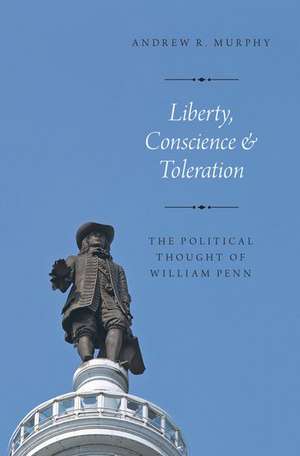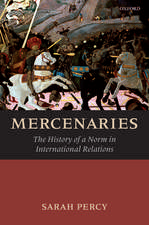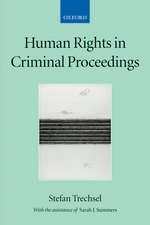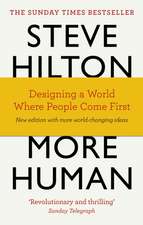Liberty, Conscience, and Toleration: The Political Thought of William Penn
Autor Andrew R. Murphyen Limba Engleză Hardback – 28 iul 2016
| Toate formatele și edițiile | Preț | Express |
|---|---|---|
| Paperback (1) | 174.95 lei 11-16 zile | |
| Oxford University Press – 21 dec 2018 | 174.95 lei 11-16 zile | |
| Hardback (1) | 582.27 lei 32-37 zile | |
| Oxford University Press – 28 iul 2016 | 582.27 lei 32-37 zile |
Preț: 582.27 lei
Preț vechi: 791.55 lei
-26% Nou
Puncte Express: 873
Preț estimativ în valută:
111.42€ • 119.14$ • 92.90£
111.42€ • 119.14$ • 92.90£
Carte tipărită la comandă
Livrare economică 07-12 aprilie
Preluare comenzi: 021 569.72.76
Specificații
ISBN-13: 9780190271190
ISBN-10: 0190271191
Pagini: 320
Dimensiuni: 236 x 160 x 23 mm
Greutate: 0.6 kg
Editura: Oxford University Press
Colecția OUP USA
Locul publicării:New York, United States
ISBN-10: 0190271191
Pagini: 320
Dimensiuni: 236 x 160 x 23 mm
Greutate: 0.6 kg
Editura: Oxford University Press
Colecția OUP USA
Locul publicării:New York, United States
Recenzii
Liberty, Conscience, and Toleration is a masterful achievement, one as remarkable for its careful treatment and painstaking analysis of early modern toleration and liberty of conscience as for its insightful reflections on political theory, practice and genre. Assessing the wide sweep of Penn's writings and actions serves as an exemplary opportunity not only to reflect on theory and its complex and at times unexpected relationship to practice but also to see more clearly the ways in which political theorizing responds to context, shapes the embodied and performative dimensions of protest and resistance, resists entrenched and coercive power, and protects religion, prudence and civil interest.
In the process of interpreting William Penn as both political theorist and political activist, Murphy not only examines the importance of William Penn for understanding political theory and action in the early modern Atlantic world but also employs Penn's career as a model for understanding "the importance of social roles and locations in the genesis and reception of political theory". He has developed a productive strategy for interpreting early modern religious and political thought.
In this latest intellectual biography of William Penn, Andrew R. Murphy draws on his exploration of the relationship between Penn's tolerationist writings and his political engagement to argue for his greater inclusion in the canon of early modern political theory. Murphy explicitly presents his study as a response to the methodological challenge of the Cambridge School, and the recent renewal of scholarly interest in the Restoration era and the Atlantic world. He argues that Penn's significance is obscured by the 'twists and turns of his political career', and yet he 'possesses all the hallmarks of a political theorist as most scholars would understand the term'. In this sense, Liberty, conscience and toleration points beyond the mere study of Penn as an individual, to propose a fundamental reconfiguration of how the canon - and indeed, theory itself - is understood.
In the process of interpreting William Penn as both political theorist and political activist, Murphy not only examines the importance of William Penn for understanding political theory and action in the early modern Atlantic world but also employs Penn's career as a model for understanding "the importance of social roles and locations in the genesis and reception of political theory". He has developed a productive strategy for interpreting early modern religious and political thought.
In this latest intellectual biography of William Penn, Andrew R. Murphy draws on his exploration of the relationship between Penn's tolerationist writings and his political engagement to argue for his greater inclusion in the canon of early modern political theory. Murphy explicitly presents his study as a response to the methodological challenge of the Cambridge School, and the recent renewal of scholarly interest in the Restoration era and the Atlantic world. He argues that Penn's significance is obscured by the 'twists and turns of his political career', and yet he 'possesses all the hallmarks of a political theorist as most scholars would understand the term'. In this sense, Liberty, conscience and toleration points beyond the mere study of Penn as an individual, to propose a fundamental reconfiguration of how the canon - and indeed, theory itself - is understood.
Notă biografică
Andrew R. Murphy is Associate Professor of Political Science at Rutgers University. His previous books include Prodigal Nation: Moral Decline and Divine Punishment from New England to 9/11 and Conscience and Community: Revisiting Toleration and Religious Dissent in Early Modern England and America.













